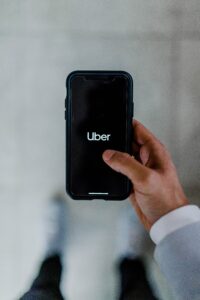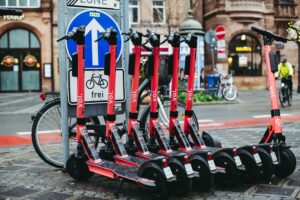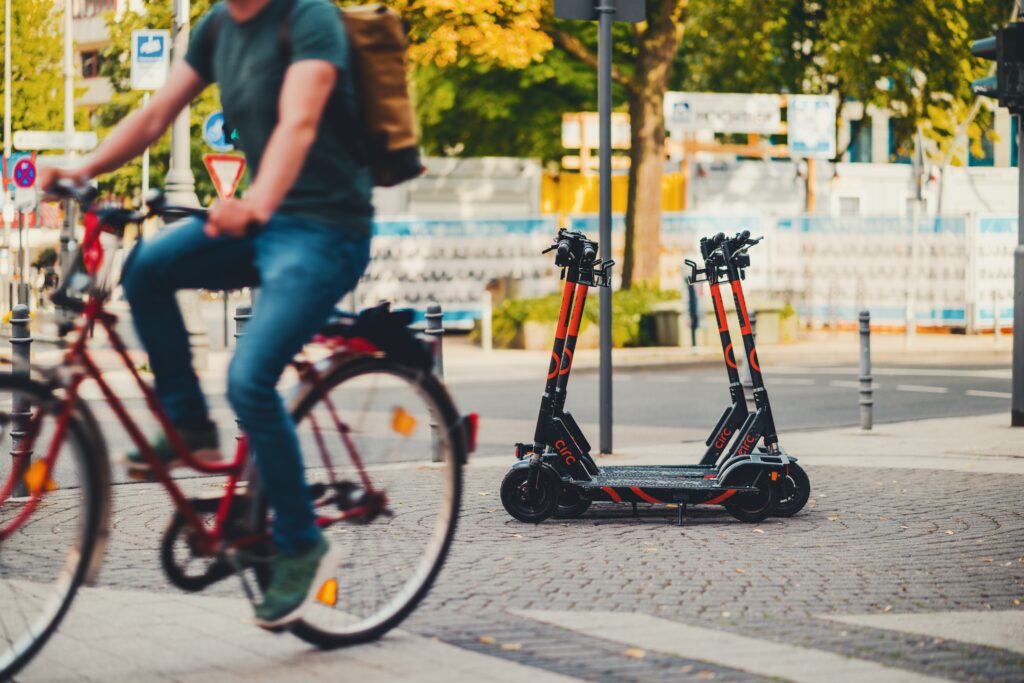Post-Lockdown Mobility webinar report: Sharing is (Still) Good
The session was opened by Pedro Homem de Gouveia, Senior Policy and Project Manager at POLIS. Pedro highlighted that with public transport capacity limited in most cities, and the desire to avoid a shift to private car use, there is an opportunity for shared mobility to show its worth as lockdown measures begin to ease. The pandemic has proved challenging for shared mobility operators, with many halting operations whilst some chose to remain during lockdown. What does the future now hold for shared mobility?
POLIS Secretary General Karen Vancluysen provided a brief introduction to shared mobility in the context of COVID-19. This has been a challenging period for shared mobility operators, and this session provides a useful opportunity to understand what happened for operators during lockdown, where we can go from here and what role shared mobility operators can play as lockdown measures ease. Karen highlighted that whilst immediate focus is on recovering from the crisis, there is a huge opportunity to create integrated, sustainable mobility systems in the coming months, which combine public and commercial mobility services. For shared mobility operators, there is now a chance to prove the worth of shared mobility to cities and regions and help to take the pressure away from public transport which is facing reduced capacity. New public-private partnerships and business models are needed to support the transition to integrated sustainable mobility, and shared mobility operators could play an active role in ensuring that cities can recover sustainably from COVID-19.
Ride-hailing: Zuzana Púčiková, Head of EU Public Policy, UBER
What happened during lockdown?
As with other operators, Uber has endured a challenging situation during lockdown. Uber ‘Rides’ (i.e. ride-hailing service) was down 80% during lockdown, with Uber encouraging customers to stay at home and only travel when absolutely necessary. For those that still had to take journeys, Uber took steps to support cities and communities. The company offered 10 million ‘key rides and deliveries’ for those in need, for example free services for essential workers or deliveries to vulnerable groups unable to leave their homes.
 To ensure the safety and hygiene of partners (i.e. Uber drivers and couriers) and customers, an in-service education campaign was launched. This was coupled with engagement with health organisations, as well as hiring the services of a specialist epidemiologist to advise the company’s actions. Around $19 million in compensation for lost earnings was paid out to more than 50,000 partners for those who were sick or quarantined as a result of COVID-19. In addition, new earning opportunities were presented for partners, such as deliveries of food or medicine. Safety measures, such as PPE and protective screens, have been rolled out in partner vehicles to keep partners and passengers safe.
To ensure the safety and hygiene of partners (i.e. Uber drivers and couriers) and customers, an in-service education campaign was launched. This was coupled with engagement with health organisations, as well as hiring the services of a specialist epidemiologist to advise the company’s actions. Around $19 million in compensation for lost earnings was paid out to more than 50,000 partners for those who were sick or quarantined as a result of COVID-19. In addition, new earning opportunities were presented for partners, such as deliveries of food or medicine. Safety measures, such as PPE and protective screens, have been rolled out in partner vehicles to keep partners and passengers safe.
To support cities during lockdown, Uber has been cooperating with public transport authorities in several cities to provide their services where public transport offering was reduced. Additionally, phone ordering of taxis was made available to support older groups who may not have access to a smartphone. In some cities, JUMP - Uber’s rental e-bike service - has been providing free e-bikes and e-scooters for essential workers. Uber Eats (Uber’s food delivery service) has adapted too, offering contactless delivery, as well as more frequent payments and waived delivery fees for partner restaurants.
Lessons learned during lockdown
Zuzana highlighted that supporting Uber partners to adapt to the ‘new normal’ would be vital in the coming months. Additionally, Uber wants to work closely with cities and public transport authorities to support their objectives during this challenging period for public transport. Zuzana noted that Uber’s solutions can be a good fit for managing the fallout for mobility for COVID-19, and that public-private partnerships driven by key outcomes such as climate change and equity could be useful in the coming months and years. Zuzana noted the potential for ‘smart subsidies’ to achieve such goals.
Looking to the future
Zuzana closed by noting that Uber is supportive of a green recovery from COVID-19 and that sustainable mobility should be prioritised. Strategic partnerships between public and private actors will be vital to ensure resilient and adaptive mobility systems which can respond to future shocks, and Uber wants to help cities in rising to this challenge.
E-scooters: Kristian Agerbo, VP Public Policy & Market Development, VOI)
What happened during lockdown?
Voi took a substantial hit during COVID-19, pulling out of 32 of 38 cities in response to travel restrictions coming into force. To support authorities, Voi took an educational approach through its app, advising customers to follow the guidance of the relevant authorities. Where Voi remained in operation, measures were taken to protect customers and staff. Extra sanitation of vehicles was carried out before placing them on the street, whilst sanitary guidelines and free gloves were provided for customers. Warehouse employees were required to wear gloves at all times.
 Kristian highlighted the ‘#Voitribution’ campaign, which saw the company offer its services to health workers to support vital services during lockdown. Voi also supported local businesses in the Nordics, for example by assisting restaurants with food delivery options. Voi is also a partner in #WeAllMove, a platform showcasing mobility options for those who still need to travel at this time.
Kristian highlighted the ‘#Voitribution’ campaign, which saw the company offer its services to health workers to support vital services during lockdown. Voi also supported local businesses in the Nordics, for example by assisting restaurants with food delivery options. Voi is also a partner in #WeAllMove, a platform showcasing mobility options for those who still need to travel at this time.
Voi remained in operation in Nordic cities and is now looking to re-open across Europe when possible, including launching in new cities such as Zurich, in partnership with SBB, the Swiss Railways.
Lessons learned during lockdown
Reflecting on key lessons from lockdown, Kristian noted how in some ways cities during lockdown became more livable, with noise and air pollution dropping rapidly and more space for walking, cycling and scooting. This has created an opportunity to embrace change and capitalise on some of these positive scenarios, for example by reallocating road space to encourage the use of sustainable modes of transport. Kristian also reflected on the fact that with social distancing requirements restricting public transport, new mobility solutions will be required. To avoid a rise in car use, bringing remaining public transport services closer together with micro-mobility will be vital. To achieve this, closer collaboration, data sharing and better integration will be necessary. On a wider level, lockdown has revealed that moving people from A to B cannot be the only aim in urban mobility; instead, we need to consider how to use mobility to move society in the right direction, too.
Looking to the future
Kristian closed by noting that whilst the future of urban mobility is hard to predict, COVID-19 will bring revolutionary changes for cities. It is clear that transport systems are not meeting all of society’s needs, and are not safe or sustainable enough. COVID-19 has caused cities to question how they think and move, with many positive examples of cities now acting to put sustainable transport first.
Bike-Sharing: Pierre de Schaetzen, CEO & Founder, Billy Bike
Billy Bike is a electric bike-share start-up founded three years ago with the key aim of moving people out of cars onto bikes, first in Brussels and with a view to expanding to other cities in the future. Now operating over 600 bikes in Brussels, Billy Bike is becoming an important part of the urban mobility network in the Belgian capital.
 Pierre explained that lockdown has brought a surprising experience for Billy Bike. After seeing a reduction in use during the first two weeks of lockdown, Billy Bike began to experience a large increase. The start-up has now quadrupled use of its bike compared to prior to lockdown. Pierre stated how lockdown has pushed many people to question how they get around and that many are now looking to bikes instead of cars for everyday journeys. Pierre noted that JUMP, Uber’s e-bike hire service, has pulled out of Brussels, and that this may have played a part in the large increase in the use of Billy Bike’s services. However, Pierre stressed that fewer actors in the bike rental space was not necessarily a good thing for Billy Bike or indeed for the city as a whole, as this may lead to unwanted increases in car use.
Pierre explained that lockdown has brought a surprising experience for Billy Bike. After seeing a reduction in use during the first two weeks of lockdown, Billy Bike began to experience a large increase. The start-up has now quadrupled use of its bike compared to prior to lockdown. Pierre stated how lockdown has pushed many people to question how they get around and that many are now looking to bikes instead of cars for everyday journeys. Pierre noted that JUMP, Uber’s e-bike hire service, has pulled out of Brussels, and that this may have played a part in the large increase in the use of Billy Bike’s services. However, Pierre stressed that fewer actors in the bike rental space was not necessarily a good thing for Billy Bike or indeed for the city as a whole, as this may lead to unwanted increases in car use.
In Billy Bike’s view, bike-sharing should be considered as the "fourth pillar of public transport" (alongside trams, buses and metros). With public transport capacity restricted for the coming months, getting more people cycling will be an important means of keeping cities moving. With many shared mobility operators entering and pulling out of cities like Brussels, change is needed to provide a more stable and secure mobility offering to citizens. Pierre highlighted the potential of strong public-private partnerships to offer more certainty and sustainability of shared mobility services in cities. These partnerships could also be used to address cost issues, which pose a barrier to some people using shared mobility services. Cities could for example pay part of the price of bikeshare trips, which would be a user-oriented subsidy, not a company-based one. Partnerships with start-ups like Billy Bikes could have particular value in small- and medium-sized cities which may not be able to attract the services of larger shared mobility operators.
POLIS members can watch this webinar on-demand in the Members Area of our website. For more information on the upcoming webinars in the Post-Lockdown Mobility series, see here.


